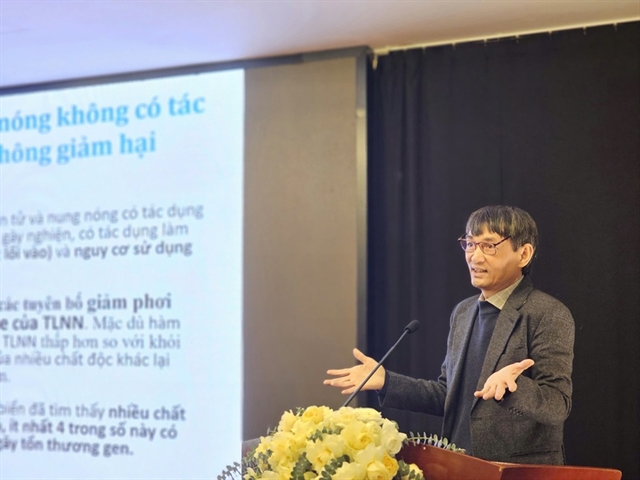 Politics & Law
Politics & Law

 |
| Nguyễn Tuấn Lâm, a representative of the World Health Organisation. — Photo baochinhphu.vn |
HÀ NỘI — The Ministry of Health’s Legal Department convened a workshop in Hà Nội yesterday to discuss the National Assembly’s resolution banning e-cigarettes and heated tobacco products, which is set to come into force on January 1.
Đinh Thị Thu Thủy, deputy head of the department, described the comprehensive ban as a landmark step in public health protection.
“These products not only lead to addiction, but also pose serious health risks such as lung damage, cardiovascular diseases and cancer. They are not a safer alternative to traditional cigarettes,” she stated.
Since 2018, the Ministry of Health has persistently advocated for this ban, underscoring its commitment to safeguarding the health of the population. With the resolution now passed, the ministry is preparing the necessary documents to ensure its swift implementation.
The Ministry of Health has been tasked with leading two critical components of the resolution's execution. It will draft a government action plan to enforce Resolution 173/2024/QH15, which mandates the full prohibition of e-cigarettes, heated tobacco products and other harmful substances from 2025.
The plan is expected to be submitted to the Prime Minister no later than the first quarter of 2025. Concurrently, the ministry is working on amendments to Decree No. 117/2020/ND-CP, introducing streamlined procedures for penalising violations related to these products.
At the workshop, Nguyễn Tuấn Lâm, a representative of the World Health Organisation (WHO) in Việt Nam, praised the decision as both timely and visionary. He highlighted the comprehensive nature of the ban, which addresses production, trade, transportation, usage and advertising. According to Lâm, the policy reflects a strong consensus and underscores Việt Nam’s commitment to protecting its younger generations.
Drawing on international experience, Lâm emphasised the importance of enforcing the ban both offline, such as at border checkpoints, and online, across e-commerce platforms. He advocated collaboration with platforms like Facebook, Telegram, Shopee and Lazada to eliminate advertisements and sales of these products. Effective enforcement, he noted, should also include monitoring user activity, tracking sales trends and launching public awareness campaigns.
Hoàng Thị Mỹ Hạnh from the Ministry of Health’s Institute of Health Strategy and Policy shared further insights into global best practices. She noted that 43 countries have already implemented bans on e-cigarettes and heated tobacco products, with 39 imposing comprehensive restrictions on their sale, advertising, use and transportation. In ASEAN, six nations, including five that adopted bans between 2014 and 2016, have enforced similar prohibitions.
Hong Kong, which initially regulated such products as pharmaceuticals, has imposed a total ban within three years. Meanwhile, Singapore offers a compelling model of enforcement. The country prohibits importing, possessing, selling or distributing tobacco imitation products. First-time offenders face fines of up to 10,000 Singapore dollars, six months’ imprisonment, or both. Repeat offenders risk penalties of up to 20,000 Singapore dollars, 12 months’ imprisonment, or both.
These measures are increasingly recognised as effective tools in deterring the spread of harmful tobacco products and protecting public health.
With strong regulations and insights from international collaboration, the Ministry of Health hopes to replicate these successes, ensuring that Vietnam’s citizens are shielded from the dangers posed by e-cigarettes and heated tobacco products. VNS